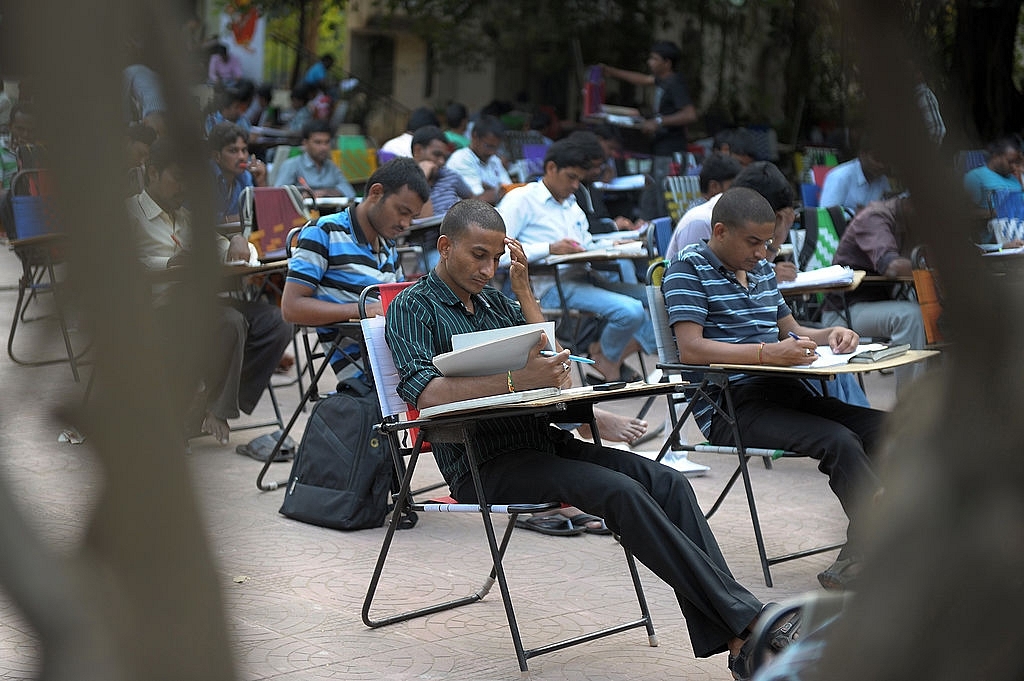Ideas
Sorry State Of Education In Tamil Nadu: Government Finally Wakes Up To The Crisis
- The performance of students from Tamil Nadu board has been abysmal in national-level hyper-competitive entrance tests like JEE, NEET, etc.
- With the government now waking up to this crisis in education sector, things may change for better.

India students examination (NOAH SEELAM/AFP/Getty Images)
Abysmal performance by the state’s students in various competitive national entrance examinations has finally forced the Tamil Nadu government to wake up from its long slumber and smell the brewing crisis in education sector.
It has decided to revise the syllabus for all schools affiliated with Tamil Nadu board starting 2018-19 academic session. The change of syllabus for the higher secondary classes is being given priority because it has not been revised for the last 12 years.
The proposed revisions come at a time where students of Tamil Nadu are falling behind in competitive national examinations. Only 792 students from the state, an overwhelming majority of them from the Central Board of Secondary Education (CBSE), were admitted to various Indian Institute of Technology (IITs), National Institute Of Technology (NITs) and Indian Institute of Information Technology (IIITs) compared to 1,757 from Madhya Pradesh, which has a comparable population but is very much behind it in development.
In Telangana, which has approximately half the population of Tamil Nadu, sent 3,500 to IITs, NITs and IIITs in 2016, meaning four times as many students were admitted from Telangana than Tamil Nadu.
In 2016, only 41 per cent of Tamil Nadu students qualified for the National Entrance cum Eligibility Test (NEET), national level entrance exam for undergraduate and post graduate medicine courses.
Contrast this with the performance of students from its neighbouring states. Kerala topped with 80 per cent of its students qualifying, followed by Telangana (77 per cent), Andhra Pradesh (73 per cent), and Karnataka (72 per cent). This is despite the state leading the national gross enrolment ratio in higher education (the state has a 38 per cent gross enrolment compared to the national average of 21 per cent).
The state’s politicians so far have avoided taking bold decisions to bring the children at par with those of the other states. For instance, earlier this year, when the government came under intense pressure from students and opposition to exempt the state’s students from NEET, the assembly buckled under pressure and passed a law to that effect. (Thankfully, President Pranab Mukherjee didn’t sign it.) This was done to shield the students from cut-throat competition and rigorous level of entrance examination. In Tamil Nadu, entrance examinations were abolished a decade ago. Students get admission to state colleges on the basis of their board marks.
The state of education in Tamil Nadu stands in stark contest to Andhra Pradesh, where N T R Rama Rao, initiated successful educational reforms about thirty years ago. He ushered in sweeping education reforms including formulating a rigorous curriculum, implemented tough mark evaluation system and a highly competitive professional entrance examination - Engineering Agricultural and Medical Common Entrance Test (EAMCET).
Students from undivided Andhra Pradesh state, and after bifurcation from its successor states of Andhra and Telangana, have been blazing a glorious trial in the national level competitive exams. Year after year, the state has been notching the highest number of students qualifying in various hyper-competitive national level tests. For instance, in 2014, of 1.5 lakh candidates who secured the JEE (Main) cut-off, over 21,000 hailed from undivided Andhra Pradesh - highest in the country.
A curriculum that encourages rote learning combined with a grade inflation regime has rendered Tamil Nadu a struggling laggard when it comes to sweepstakes in the national level tests. Efforts to upgrade syllabus has been patchy including rollout of the much touted Samacheer Kalvi (equitable education) which has made little to no impact in improving learning outcome.
Efforts to toughen education standards in Tamil Nadu have often resulted in acrimonious debates including spurious accusations that it will go against the principles of 'social justice', a slogan by which all parties swear by.
The decision to revise the syllabus is thus a welcome change. “The government is looking at various strategies, including honing the higher-order thinking skills of students, giving weightage to Class XI marks to prevent students from skipping classes, and putting in place a competitive exam-oriented curriculum that's better than that of CBSE,” the Times of India quoted a government official as saying in its report. Well, better late than never.
Introducing ElectionsHQ + 50 Ground Reports Project
The 2024 elections might seem easy to guess, but there are some important questions that shouldn't be missed.
Do freebies still sway voters? Do people prioritise infrastructure when voting? How will Punjab vote?
The answers to these questions provide great insights into where we, as a country, are headed in the years to come.
Swarajya is starting a project with an aim to do 50 solid ground stories and a smart commentary service on WhatsApp, a one-of-a-kind. We'd love your support during this election season.
Click below to contribute.
Latest